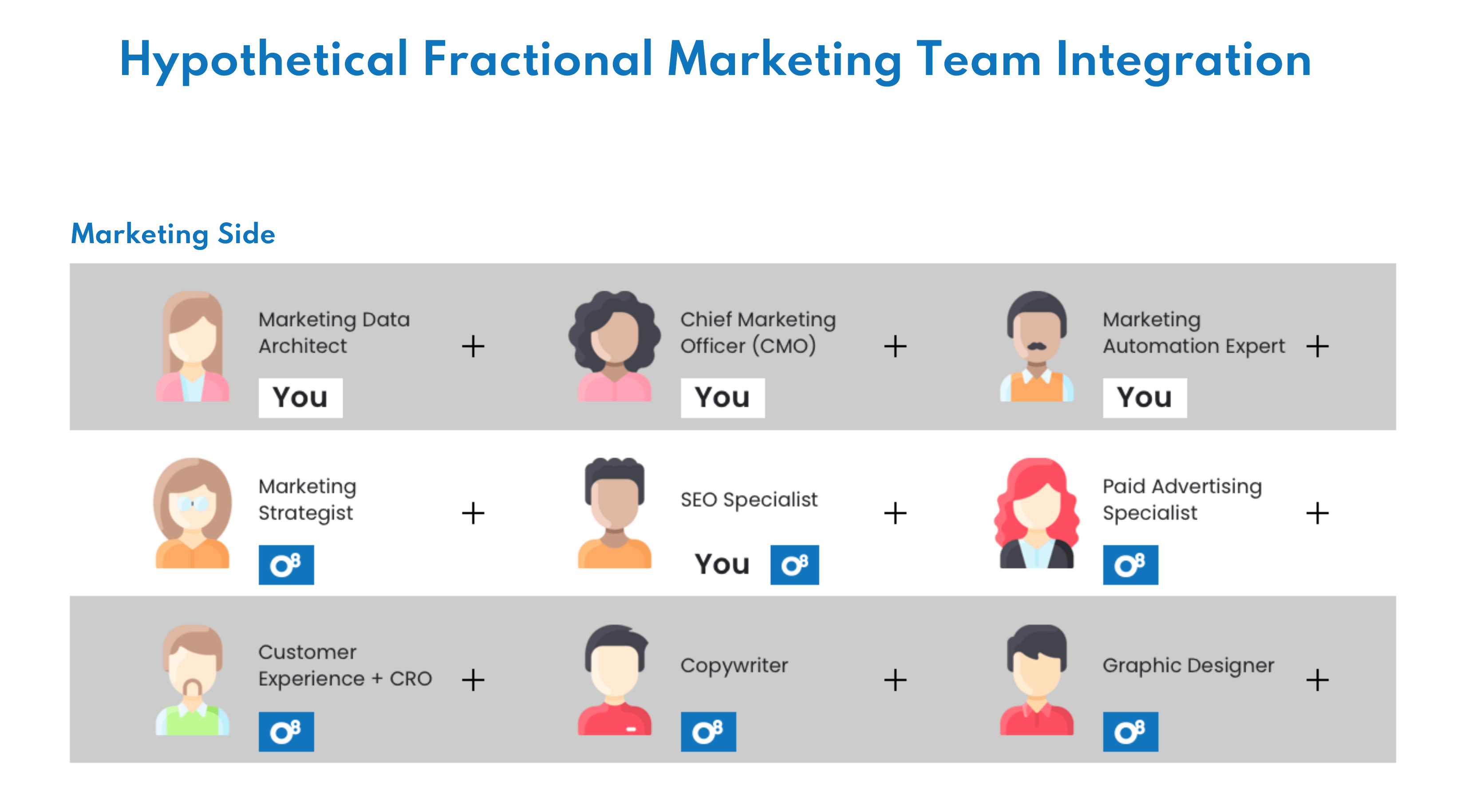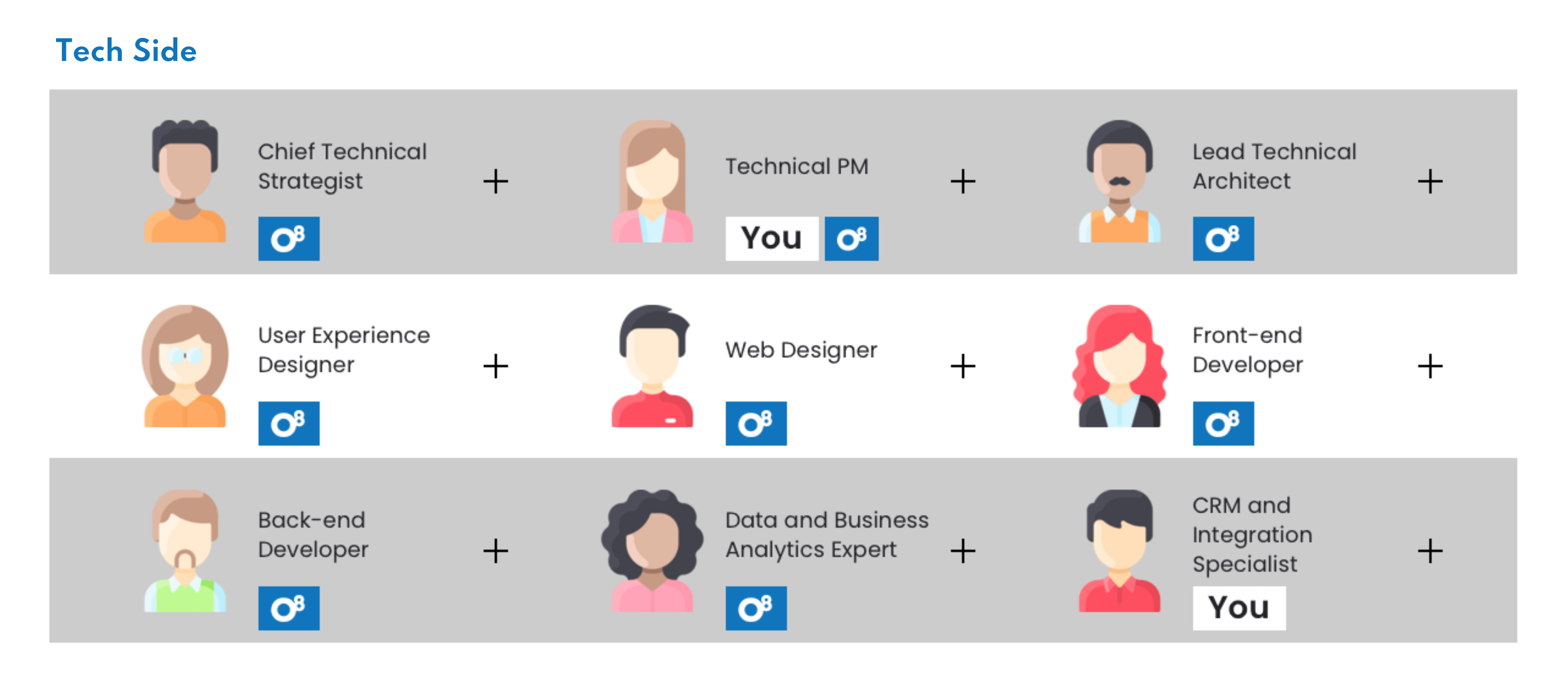Fractional Marketing Teams: Definition + Benefits

- The costs of hiring full-time marketing team members and executives can be prohibitive.
- The marketing world demands diverse expertise in areas like SEO, content marketing, and data analytics.
Traditional marketing teams often face slow implementation and resource limitations.
Picture this: you have access to top-tier marketing expertise without the hefty full-time executive price tag. This is the magic of fractional marketing teams, an increasingly popular choice among businesses striving for efficiency and effectiveness. With the adoption of fractional CMOs increasing by over 60% in recent years, it’s clear that businesses are recognizing the value of this flexible model.
Fractional marketing teams offer a cost-effective way for businesses to access specialized skills and strategic guidance, allowing them to scale their marketing efforts according to their needs. By leveraging these teams, companies can achieve faster strategy rollouts, improved ROI, and significant cost savings.
Fractional marketing solutions provide a fresh approach to overcoming these challenges, enabling businesses to stay competitive and agile. How could your team benefit from accessing this level of expertise without the full-time commitment?
Learn about the perfect digital marketing team structure
What is a Fractional Marketing Team?

A fractional marketing team is a group of marketing professionals who work for your business on a part-time or project-based basis. Unlike hiring a full-time in-house team, a fractional team provides you with access to high-level expertise and diverse skill sets without the commitment and overhead costs associated with full-time employees.
These teams are composed of specialists across various marketing disciplines, such as digital marketing, content creation, SEO, social media management, and more. The key advantage of a fractional marketing team is its flexibility. You can scale their involvement up or down based on your current needs and goals.
The Benefits
Imagine unlocking the potential of a full-fledged marketing team without the overhead costs of hiring full-time executives. This is the promise of fractional marketing teams–a flexible, adaptable solution that suits the varied needs of businesses.
One substantial advantage of fractional marketing teams is their cost-effectiveness. Companies can save an average of 40% on marketing costs compared to full-time hires, according to Deloitte. This means businesses can access high-level talent without the financial burden of full-time salaries and benefits.
In addition to cost savings, fractional marketing teams offer unmatched flexibility. They allow companies to scale their marketing efforts up or down based on current needs, project demands, or budget fluctuations. This flexibility is crucial in today’s fast-paced marketing environment, where agility can be a significant competitive advantage.
Furthermore, fractional teams bring specialized skills to the table. In a marketing landscape that requires expertise in SEO, content marketing, and data analytics, having access to specialists who can address specific challenges is invaluable. This specialized knowledge can drive significant improvements in marketing ROI, with 57% of companies observing an increase after implementing a fractional marketing strategy, as noted by PwC.
By choosing fractional marketing teams, businesses not only optimize their resource allocation but also gain access to diverse experience and fresh perspectives. This diversity can spark innovative strategies that might be overlooked by internal teams.
Want to see a real-live example? Check out our team.
Overview of The Benefits
- Cost-Effective Solution: Hiring full-time marketing staff can be expensive, especially for startups and small businesses. Fractional teams provide top-tier talent at a fraction of the cost.
- Access to Specialized Skills: With a fractional team, you gain access to specialists with a diverse range of skills and experiences, ensuring that all aspects of your marketing strategy are covered.
- Scalability and Flexibility: Whether you need support for a short-term project or ongoing marketing efforts, a fractional team can adjust to meet your needs, allowing for greater flexibility.
- Quick Onboarding: Fractional marketing teams are usually ready to hit the ground running, with minimal onboarding required. This means you can start seeing results faster.
- Focus on Core Business: By outsourcing your marketing efforts to a fractional team, you can focus on your core business activities, knowing that your marketing is in capable hands.
If you're interested in exploring how a fractional marketing team can benefit your business, check out our Fractional Marketing Team page for more information.
In the next sections, we’ll dive into when to hire a fractional marketing team and how to ensure you choose the right one for your business needs.
Learn more about fractional marketing team services
Why And When To Hire?
Why Hire a Fractional Team?
Businesses are looking towards solutions like fractional marketing teams to overcome the following market challenges:
Increasingly Complex Marketing Landscape
Forrester found that 68% of B2B buyers today prefer doing business online. Traditional marketing methods like in-person presentations are not as effective in such a landscape as they were. As more B2B businesses move their purchasing activities online, MarTech has risen to fill the gap left by traditional marketing methods.

B2B companies are finding they need to quickly adopt MarTech and make it work in a race to capture online leads. Fractional marketing teams offer the only practical way to bring in talent, tools, and processes quickly and cost-effectively to help B2Bs navigate this complex marketing landscape.
Increasing Pressure on Marketing Budgets
Hiring a full-time CMO can set a company back, on average, $397,572. Not surprisingly, businesses opt for leaner marketing strategies to rein costs and maximize returns. They simply cannot afford to spend so much money without a guarantee of returns. Fractional marketing teams provide the best of both worlds; highly specialized services without the prohibitive costs of hiring full-time talent.
Marketing Shifting from A Cost Center to A Revenue Center
Traditional perceptions have placed the marketing role right beside customer experience and finance. It is an important department, just not one that brings in money. A lot has changed since those good old days.
Marketers are now under pressure to prove their department is not a cost center but a revenue driver. However, most lack the skills and tools to make this transition.
Hiring a fractional marketing team can help a business increase ROI from marketing spend through modern marketing strategies like revenue attribution.
High turnover of CMOs
Marketing has never enjoyed the security of tenure, not like finance and sales. CMOs are the most likely C-suite members to churn, averaging only forty months in office compared to CEOs who remain in office for an average of eighty-five months.
Such high marketing executive churn is expected due to intense pressure to deliver profitable growth, address changing demands for business transformation, and keep up with increasing complexity in the broader marketing landscape.
Fractional Chief Marketing Officers and teams are marketing professionals with extensive marketing experience and skills from working on marketing campaigns in multiple industries and verticals and can meet these challenges head-on to deliver significant ROI on marketing spend.
The Challenge of Omnichannel Marketing
B2B’s cannot afford to ignore omnichannel marketing because of these reasons:
- According to McKinsey, omnichannel is the standard, not the exception.
- TechRepublic found that 75% of B2B customers would buy from their provider again if they had omnichannel capabilities.
- Data from Think with Google shows that omnichannel strategies drive an 80% higher rate of total store visits.
While it is arguable that most B2Bs understand the need for omnichannel marketing, most lack the internal talent, technology, and expertise to implement effective omnichannel strategies.
O8’s fractional marketing team has experience deploying B2B omnichannel capabilities in multiple industries. Our experienced marketing team can provide technology and skills to add omnichannel marketing to your marketing mix.
When Should You Hire a Fractional Marketing Team?
Hiring a fractional marketing team can be a game-changer for your business. Understanding when to bring on this specialized support can make all the difference in driving your marketing success.
Key Scenarios for Hiring a Fractional Marketing Team
- Not Getting Desired Results: When your marketing efforts aren’t yielding the expected results, it may be time to bring in a fresh perspective. Fractional marketing teams offer specialized expertise and innovative strategies that can rejuvenate your campaigns and improve overall performance.
- Fragmented Marketing Efforts: If your marketing strategy feels fragmented or lacks cohesion, a fractional team can integrate various elements into a unified approach. They bring experience in creating holistic marketing strategies that align with your business goals and resonate with your target audience.
- Need for Specialized Skills and Senior-Level Strategy: As marketing becomes increasingly complex, having access to specialized skills in areas like SEO, content marketing, and digital advertising is crucial. Additionally, many offer access to fractional CMO leadership and senior-level strategists. Fractional marketing teams provide these specialized skills without the long-term commitment of hiring full-time staff.
- Overwhelmed In-House Team: If your existing marketing team is struggling to keep up with the workload, deadlines are slipping, and quality is suffering, it’s time to consider additional support. A fractional marketing team can provide the extra hands and expertise needed to manage the load effectively.
- Navigating a Transition: During periods of change, such as a rebranding, new product launch or development, changing GTM strategy, leadership changes, or even extended team member absences (e.g. maternity leave, injury, sabbatical, etc), having an experienced fractional team can help you navigate these challenges smoothly and fill in any gaps.
- Scaling a Startup: Startups often need to move quickly but may not have the budget for full-time senior marketing talent. Fractional teams offer a cost-effective way to access experienced professionals who can help scale your efforts without the long-term financial commitment.
- Short-Term Projects: When you have specific marketing campaigns or projects that require specialized skills, a fractional team can step in and deliver results. This ensures you get the expertise you need without the long-term commitment.
- Limited Budget but High Expectations: Businesses with tight budgets (relative to company size) but ambitious marketing goals can greatly benefit from a fractional marketing team. You can access top-tier talent without the overhead costs of full-time employees, making it a cost-efficient solution.
By recognizing these scenarios, you can better determine when it’s the right time to bring in a fractional marketing team. For more on the cost-effectiveness and benefits of this approach, explore our detailed post on Why Fractional Marketing is Cost-Effective.
In the following sections, we'll guide you through the process of hiring the right fractional marketing team and how to integrate them seamlessly with your existing operations.
Working Together
Integrating With Your In-House Team
Successfully integrating a fractional marketing team with your in-house marketing team is essential for seamless collaboration and optimal results. Here are some strategies to ensure smooth integration and effective marketing efforts.
Strategies for Seamless Integration

- Clear Communication Channels: Establish clear communication channels and protocols from the outset. Use tools such as Slack, Trello, or Asana to keep everyone on the same page. Regular meetings and updates ensure transparency and alignment between your in-house team and the fractional marketing team.
- Define Roles and Responsibilities: Clearly define the roles and responsibilities of both the fractional team and your in-house team. This helps avoid overlap and ensures that each team member knows their specific duties, facilitating smooth workflow and cooperation.
- Collaborative Tools and Platforms: Utilize collaborative tools and platforms to streamline project management and collaboration. Tools like Google Drive, shared calendars, and project management software allow both teams to work harmoniously and stay organized.
- Shared Goals and KPIs: Align both teams on shared goals and key performance indicators (KPIs). This ensures that everyone is working towards the same business goals and understands the metrics for success. Regularly review these KPIs to track progress and make necessary adjustments.
- Cultural Integration: Foster a culture of inclusion and collaboration by involving the fractional team in company meetings, events, and social activities. This helps build rapport and trust, making it easier for them to integrate with your in-house team.
- Regular Feedback and Optimization: Establish a feedback loop to continuously improve collaboration and performance. Regularly solicit feedback from both teams and make adjustments as needed to optimize the working relationship.
By implementing these strategies, you can ensure a smooth integration of your fractional marketing team, leading to more effective marketing outcomes. For more insights on improving marketing team performance, visit our blog post on How Marketing Teams Can Work Smarter.
In the following section, we’ll discuss how fractional marketing teams can be particularly effective for small businesses, providing the expertise and flexibility needed to thrive in a competitive market.
Seven Best Practices for Successful Engagements
The previous section offered insights on why B2B companies should explore fractional marketing as an alternative to traditional full-time marketing and outsourced marketing.
This section addresses how to approach fractional marketing teams. As marketing experts at O8, these are our seven essential fractional marketing team best practices.
Fractional CMO ≠ Fractional Marketing Team
Whenever the term ‘fractional marketing’ comes up, what immediately jumps to mind is fractional CMO, and rightly so. This fractional marketing leader is critical to any modern company that wants to infuse expert marketing leadership into an internal team.
However, a fractional marketing team extends to hiring an entire marketing team or department on a fractional basis. As such, when considering your marketing needs, be aware that your marketing needs can be served by a fractional marketing director, a fractional marketing team, or both.
Define Performance Metrics Early
Unlike an internal B2B marketing team structure that handles all marketing tasks, from the mundane to the mission-critical, a fractional marketing team delivers key outcomes in specific areas.

The best way to achieve this is to define KPIs early. For example, when hiring a fractional marketing team to integrate omnichannel capabilities, ensure you define KPIs tied to this specific deliverable to ensure the team remains aligned with your expectations.
Have a Mid-Long-Term Outlook
Although you can hire a fractional marketing team for project-based work, it is essential to tie their work to a longer-term strategic plan. One mistake B2B businesses often make is trying to package a long-term strategy as a short-term project.
For example, if you hire a fractional marketing team for a content marketing project, their work might last six months, but you may reap the benefits of their efforts for years to come.
Look for Diversity of Skills
The best fractional marketing teams have various skills like social media, SEO, Conversion Rate Optimization, paid ads and PPC, and MarTech like CRM and analytics. The more diverse the skills represented within the team, the better the chances that you will not need to hire additional marketing talent to plug any skill gaps.
In addition, when hiring a fractional marketing team, consider the presence of a CMO within the team, as you do not want to hire a team that looks to you for leadership.
Involve Sales and Customer Success
Do not lock out your sales and customer success teams from the process of hiring a fractional marketing team. The best results come from looping in both departments and providing them a seat at the marketing decision-making table. With their input, you can better define deliverables and KPIs and provide the fractional marketing team with the data and insights they need to deliver the best results possible.
Set Realistic and Achievable Goals
The fractional marketing team at O8 is exceptional at what we do, and we thrive in an environment that sets realistic and achievable goals. One of the challenges we have seen businesses face is the difficulty of matching realistic goals and market pressures.
When hiring a fractional marketing team, formulate goals and objectives collaboratively so that they are based on facts and attainable aspirations. The best fractional marketing teams will always ensure the goals are SMART because such goals benefit everyone.
Working With In-House Staff

One of the significant advantages of hiring a fractional marketing team is their ability to work seamlessly alongside your in-house staff. This collaboration can enhance your marketing efforts, bringing new perspectives, specialized skills, and additional bandwidth to your team. Here's how to ensure effective collaboration:
Enhancing Capabilities without Redundancy
- Complementary Skills: Identify the strengths and weaknesses of your in-house team and the fractional team. Ensure that the fractional team brings complementary skills that fill gaps in your current marketing operations. This prevents redundancy and maximizes the capabilities of both teams.
- Coordinated Strategy: Develop a coordinated marketing strategy that integrates the efforts of both teams. Clearly outline the objectives, deliverables, and timelines. This ensures that everyone is aligned with the overall business goals and working towards the same outcomes.
- Joint Planning Sessions: Hold joint planning sessions where both teams can collaborate on strategy development and campaign planning. These sessions foster teamwork and ensure that both teams are on the same page regarding marketing initiatives.
- Regular Check-Ins and Updates: Schedule regular check-ins and updates to monitor progress and address any challenges promptly. These meetings help maintain open communication and ensure that both teams stay in sync.
- Shared Resources: Utilize shared resources such as project management tools, content calendars, and marketing automation platforms. This facilitates collaboration and ensures that both teams have access to the information and tools they need to succeed.
- Feedback and Continuous Improvement: Establish a feedback loop that allows both teams to share insights and suggestions for improvement. Continuous feedback helps refine processes and enhances the overall effectiveness of your marketing efforts.
By leveraging the strengths of both your in-house staff and a fractional marketing team, you can create a collaborative environment that drives better results. To explore more on structuring an effective marketing team, visit our blog post on Successful B2B Marketing Team Structure: The Ultimate Guide.
In the next section, we'll identify the industries that benefit most from a fractional marketing team and discuss how these teams can drive significant value across various sectors.
Find Out If Fractional Marketing Is Right For Your Business
Making The Right Choice
How to Hire the Right Team
Hiring the right fractional marketing team requires a strategic approach to ensure alignment with your business goals and marketing needs. Here’s a step-by-step guide to help you find the perfect fit.
Steps to Hire a Fractional Marketing Team
- Define Your Needs and Goals: Before starting your search, clearly outline your business goals and marketing needs. This will help you identify the specific skills and expertise required. Consider the areas where your current team could use support, whether it’s enhancing brand awareness, executing a new campaign, or refining your marketing operations.
- Research and Shortlist Candidates: Look for fractional marketing teams with a proven track record of success in your industry. Check their portfolios, client testimonials, and case studies. Prioritize teams that have experience with in-house marketing teams and can demonstrate effective marketing strategies.
- Evaluate Skills and Expertise: During the vetting process, assess each team's skills and expertise. Ensure they have the right mix of marketing functions covered, from SEO and content creation to strategic marketing and social media management. Ask about their experience working on a retainer basis to understand their commitment and ability to deliver ongoing support.
- Conduct Interviews: Once you have a shortlist, conduct interviews to gauge their understanding of your business goals and their approach to achieving them. This is also an opportunity to assess their communication style and compatibility with your in-house marketing team.
- Request Proposals: Ask the shortlisted teams to provide detailed proposals outlining their approach, strategies, and expected outcomes. Evaluate these proposals based on how well they align with your business goals and how comprehensively they address your marketing needs.
- Check References: Before making a final decision, check references to verify the team's track record and client satisfaction. This will provide you with insights into their reliability, effectiveness, and ability to deliver results.
By following these steps, you can hire a fractional marketing team that complements your in-house efforts and helps drive your marketing operations forward. Now, let's discuss some qualitative aspects to look for in a fractional marketing team.

We have identified seven crucial factors to consider in hiring a fractional marketing team:
1. Marketing Leadership and Growth Strategy
The fractional marketing team must provide an integrated growth strategy linked to your company’s marketing goals. The strategy must reflect your strenghts, weaknesses, opportunities, and threats (SWOT) and the steps required to achieve identified KPIs.
Similarly, the marketing team structure must provide marketing leadership in assembling and directing necessary resources towards executing set goals in achieving the laid-out strategy. This may come in the form of a fractional CMO, or someone on the team who can think like a CMO and fill CMO-like duties.
Also consider noting that the team must offer both strategic and tactical support to ensure the project runs smoothly from start to finish.
2. Branding and Messaging
Branding and messaging are crucial to your marketing success. The fractional marketing team must have the requisite art direction skillset to ensure marketing collateral and deliverables conform to your organization's image, tone, and voice.
The team must understand how to position marketing content to align with your branding to resonate with target audiences without alienating legacy audiences.
3. ABM, Go-to-Market, and Sales Capabilities
Sales is sometimes considered separate from marketing, but in today's world it's absolutely inseparable. Sales-focused capabilities such as account-based marketing (ABM), Go-to-Market strategy (GTM), and other sales-driven capabilities are crucial to succeed, especially in B2B contexts.
It is essential to ensure that the fractional marketing team you hire understands how to integrate these strategies and processes into your marketing efforts, which is also part of sales and marketing alignment, covered below.
4. Marketing and Sales Alignment
Marketing and sales alignment are vital to any company’s success. One of the challenges of bringing in a fractional marketing team is the relative disconnection with internal sales teams. While the in-house teams may be aligned with sales, outside teams may not.
It is, therefore, crucial to ensure the fractional team you hire understands the importance of sales and marketing alignment. They should prioritize such alignment through shared goals, centralized communications, connected systems (e.g., CRM), and data visibility (no silos).
5. Digital Marketing Capabilities
SEO, PPC, and social media are no longer just B2C marketing channels. No matter how sophisticated your B2B buyers are or how far removed they are from the consumer market, digital marketing is now a permanent fixture of the B2B marketing mix.
As such, your target part-time fractional marketing team must include extensive digital marketing capabilities to ensure you are at the forefront of digital marketing trends. Look for a wide array of services.
For example, marketing videos are a significant trend B2Bs are yet to catch up with, even though 96% of people learned more about a product or service by watching an explainer video, and 88% say watching a brand’s video convinced them to purchase.
6. Marketing Infrastructure and Technology Partners
The last piece of the puzzle is the fractional marketing team’s ability to source, test, and implement new MarTech tools, as well as bringing existing technology partnerships to the table.
7. Flexible Integration
Ultimately, the fractional marketing team must be flexible enough to fill in where needed. There may be some cases where your team takes part of a given role, and the fractional marketing team supplements the other half. In other situations, the fractional marketing team may take all (or none) of a given role. Flexibility is key to meld in with your current marketing team, including the critical fractional CMO role.


For Small Businesses

Small businesses often face unique challenges when it comes to marketing. Limited budgets, a lack of specialized skills, and the need for quick scalability can all pose significant hurdles. This is where a fractional marketing team can offer a substantial advantage.
Benefits for Small Businesses
- Cost-Effective Expertise: Small businesses can access high-level marketing expertise without the financial burden of hiring full-time employees. Fractional marketing teams provide specialized skills at a fraction of the cost, making them a budget-friendly option.
- Scalability: As your business grows, your marketing needs will evolve. A fractional team can easily scale its efforts to match your growth trajectory, providing the flexibility to increase or decrease support as needed.
- Diverse Skill Sets: Fractional marketing teams bring a wide range of skills and expertise to the table, from SEO and content marketing to social media and paid advertising. This ensures that all aspects of your marketing strategy are effectively covered.
- Quick Implementation: Fractional teams are often ready to hit the ground running, with minimal onboarding required. This means you can start seeing results more quickly, which is crucial for small businesses that need to make an impact fast.
- Focus on Core Business Activities: By outsourcing your marketing efforts to a fractional team, you can concentrate on your core business activities. This allows you to focus on what you do best while knowing that your marketing is in capable hands.
Small businesses can greatly benefit from the flexibility and expertise offered by a fractional marketing team. For insights on creating a robust marketing plan that leverages fractional marketing services, take a look at our guide on How to Create a Marketing Plan in 10 Steps.
In the next section, we'll delve into how fractional marketing teams can effectively work alongside in-house staff, enhancing capabilities without redundancy.
Find the Right Team Structure for Growth
This playbook breaks down proven fractional team setups so you can build a marketing team that delivers, without the bloat.
Various Industries
Fractional Teams for Various Industries
Fractional marketing teams can provide significant value across a wide range of industries. By bringing specialized skills and strategic expertise, these teams help businesses enhance their marketing efforts, improve brand awareness, and achieve their business goals more efficiently. Here are some industries that particularly benefit from fractional marketing teams.
Technology and Startups
In the fast-paced world of technology and startups, marketing needs can change rapidly. A fractional marketing team offers the agility to adapt quickly and implement cutting-edge strategies. For example, tech startups can utilize our fractional marketing services to scale their marketing efforts without the overhead costs of full-time hires.
Why Fractional Marketing Teams Are Ideal for the Tech Industry
The tech industry thrives on rapid innovation and constant evolution, making it crucial for companies to maintain a flexible and dynamic approach to marketing. Fractional marketing teams offer an ideal solution for tech companies looking to stay competitive in this fast-paced environment.
One of the key advantages of fractional marketing teams in tech is their ability to provide specialized, high-level expertise without the long-term commitment of full-time hires. Tech companies often require niche skills in areas like AI, machine learning, and data analytics, which can be challenging to find in traditional marketing teams. By leveraging fractional marketing teams, tech companies can access these specialized skills on demand, ensuring they have the right talent for specific projects.
The tech industry also benefits significantly from the agility and speed that fractional marketing teams offer. In a sector where product lifecycles are short and new technologies emerge rapidly, having a marketing team that can quickly adapt and respond to changes is invaluable. Fractional teams are well-equipped to handle these rapid shifts, enabling tech companies to launch new products faster and more efficiently. This ability is underscored by the fact that companies utilizing fractional CMOs report a 48% faster time-to-market for new products and services.
Moreover, cost savings are another compelling reason for tech companies to embrace fractional marketing teams. Tech startups and SMEs often operate on tight budgets, and the cost-effectiveness of fractional teams allows these companies to allocate resources more efficiently. This model reduces overhead costs associated with full-time salaries and benefits, freeing up capital for other critical areas of development and innovation.
In summary, fractional marketing teams provide tech companies with specialized expertise, agility, and cost savings, making them an indispensable asset in navigating the complexities of the tech landscape. By embracing this model, tech businesses can maintain their competitive edge and drive sustained growth.
SaaS
In the realm of Software as a Service (SaaS), the need for innovative and adaptable marketing strategies is paramount. Fractional marketing teams offer unique advantages for SaaS companies, enabling them to thrive in this competitive and fast-evolving sector.
Why Fractional Marketing Teams Are Perfect for SaaS Companies
SaaS companies often grapple with the challenge of differentiating their offerings in a crowded market. Fractional marketing teams bring specialized expertise in areas such as digital marketing, customer retention strategies, and advanced analytics–key components that can set a SaaS company apart. By tapping into these specialized skills, SaaS businesses can craft targeted campaigns that resonate with their audience and drive user engagement.
The flexibility of fractional marketing teams is another reason they are particularly well-suited to the SaaS industry. SaaS companies frequently experience rapid growth and need marketing strategies that can scale accordingly. Fractional teams offer the agility to quickly adapt to changing market demands, allowing SaaS companies to seize opportunities and address challenges head-on. This adaptability is essential in an industry where product updates and feature rollouts occur frequently.
Cost efficiency is also a significant benefit for SaaS companies utilizing fractional marketing teams. Given the subscription-based revenue models typical of SaaS businesses, managing costs is critical to profitability. Fractional teams provide access to top-tier marketing talent without the financial burden of full-time salaries and benefits, enabling SaaS companies to allocate resources more strategically. According to Deloitte, businesses can save an average of 40% on marketing costs by opting for fractional services.
In conclusion, fractional marketing teams offer SaaS companies the specialized expertise, flexibility, and cost savings needed to excel in the competitive SaaS landscape. By leveraging these teams, SaaS businesses can enhance their marketing efforts, drive user acquisition, and maintain a strong market presence.
Manufacturing
Manufacturing companies are navigating an era of transformation, where innovation and efficiency are key to maintaining a competitive edge. Fractional marketing teams provide a strategic advantage for manufacturers looking to optimize their marketing efforts without the constraints of traditional hiring models.
Why Fractional Marketing Teams Are Essential for Manufacturing Companies
A primary benefit of fractional marketing teams in the manufacturing sector is their ability to bring specialized marketing skills that are often not found in-house. Manufacturing companies typically focus on production and operational efficiencies, which can lead to gaps in marketing expertise, particularly in digital strategies and customer engagement. Fractional teams fill these gaps by offering skills in areas like SEO, content marketing, and digital advertising, enabling manufacturers to reach broader audiences and enhance brand visibility.
The flexibility offered by fractional marketing teams is also crucial for manufacturers. In an industry where market conditions can shift rapidly due to technological advancements or supply chain disruptions, having a marketing team that can quickly pivot and adapt is invaluable. Fractional teams provide the agility needed to respond to these changes, allowing manufacturers to implement timely marketing initiatives that align with market demands.
Cost efficiency is another compelling reason for manufacturers to utilize fractional marketing teams. These teams allow companies to access high-quality marketing expertise without the overhead costs associated with full-time employees. This makes it easier for manufacturers to allocate their budgets towards other critical areas of the business, such as research and development or technology upgrades.
Furthermore, fractional marketing teams bring diverse perspectives and industry insights that can drive innovation within manufacturing companies. By leveraging the experience and knowledge of fractional marketing professionals, manufacturers can develop innovative strategies that differentiate their offerings and capture market share.
In summary, fractional marketing teams offer manufacturing companies the specialized skills, flexibility, and cost efficiencies needed to navigate the complexities of the modern manufacturing landscape. By adopting this model, manufacturers can enhance their marketing capabilities and foster sustained growth.
Healthcare
The healthcare sector requires precise and compliant marketing practices. A fractional marketing team can bring expertise in healthcare marketing, helping organizations navigate regulations and reach their target audience effectively. Explore how we support healthcare marketing with our range of healthcare marketing services.
Financial Services
Financial services companies benefit from strategic marketing to build trust and credibility. Fractional marketing teams can provide insights into data-driven marketing strategies that resonate with clients. For more on our approach, check out our financial services marketing solutions.
Higher Education
Institutions in higher education face unique challenges in attracting and retaining students. A fractional marketing team can help develop effective enrollment campaigns, online engagement strategies, and more. See how we’ve helped other institutions in our higher education marketing portfolio.
E-commerce
E-commerce businesses thrive on robust digital marketing strategies. A fractional marketing team can optimize your online presence, manage paid media campaigns, and enhance your SEO efforts. Discover how we boost e-commerce success with our E-commerce marketing services.
Nonprofits
Nonprofits often operate with limited resources but have ambitious goals. A fractional marketing team can provide the expertise needed to create impactful campaigns and increase donor engagement. Learn more about our work with nonprofits on our nonprofit marketing page.
By leveraging the specialized skills and flexibility of a fractional marketing team, businesses in these industries and beyond can achieve significant marketing success. For more detailed insights on how fractional marketing can benefit different sectors, visit our Fractional Marketing Team page.
Conclusion
Fractional marketing teams are helping transform marketing into a revenue driver for companies ranging from startups to Fortune 500 companies. When correctly implemented, hiring a fractional marketing team should:
- bring new skills, experience, and tools to your organization
- drive revenue, positively changing the trajectory of your sales and marketing
O8's fractional marketing team is a self-managing, expert-level marketing team that scales and adjusts to your marketing needs at a fraction of the cost. We seamlessly integrate with your marketing and sales team, adding the necessary role(s) on-demand, so you get the proper support when needed.
Our team members fill eighteen distinct roles on an hourly basis, including marketing data architect, SEO specialist, automation expert, project manager, and others on the marketing front and chief technical strategist, UX designer, and front and backend developer, among others, on the technology side.
Contact us today to explore how our fractional marketing team services and Fractional CMO services can help you successfully launch a new product, accelerate your marketing programs, and take your marketing ROI to the next level.










